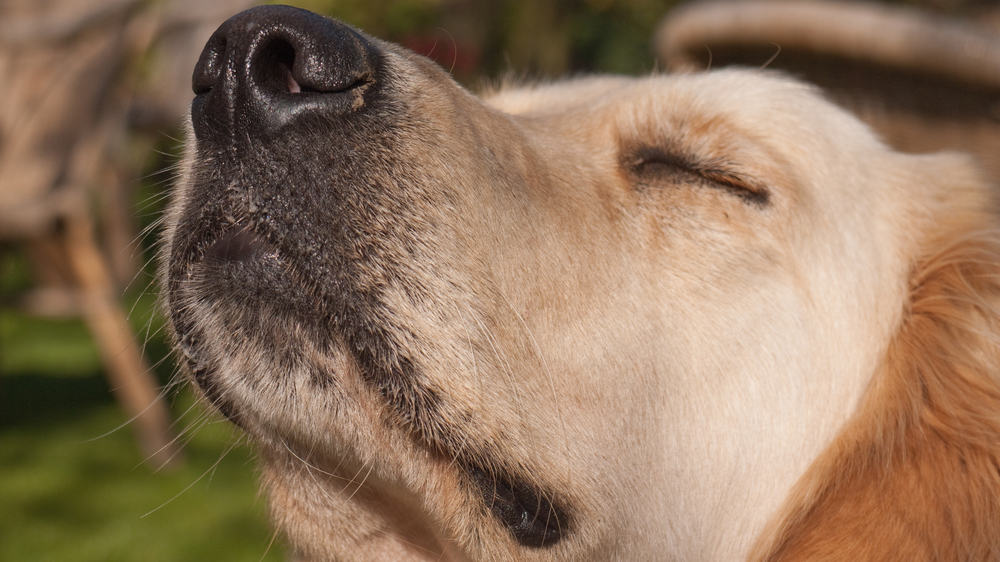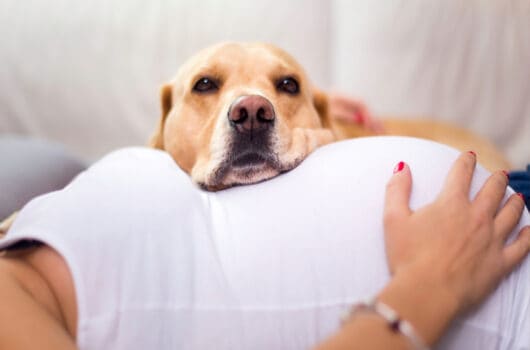All dog lovers believe their pet is truly amazing, but when you’re pregnant and have a beloved pooch, it’s possible you may notice some fascinating changes in your dog’s behavior that suggests that your furry friend is all-too-aware that you’re expecting a new arrival.
A common question among expectant moms is “can dogs sense pregnancy?” – often because their own four-legged companion has begun to show signs of being more loving or protective since they got their positive test. So, is it true that our pets know when we’re awaiting the arrival of a new addition, sometimes even before we do?
Dogs Can Sense More Than You Might Expect
Dogs are certainly incredibly observant of the world that surrounds them – more so that a lot of people realize. If your dog is acutely observant, then it’s no wonder that you’re wondering whether they are able to sense that you’re pregnant.
Dogs are capable of detecting a range of remarkable things. In fact, research has shown that dogs can spot cases of prostate cancer simply by sniffing a human urine sample, can detect when blood sugar levels are too high or too low through changes in body odor, and can even sense narcolepsy by recognizing changes in the scent of their owner’s sweat.
Do Dogs Smell Changes in Hormones?
The human body undergoes numerous changes during pregnancy, and if you think your dog is picking up on those changes, it’s possible that their unusual behavior may not all be in your imagination. There could be some truth in it!
When you’re pregnant, your hormone levels naturally rise. This is healthy and completely normal, and it is also essential. hCG, or human chorionic gonadotropin, is one hormone that the body can only produce during pregnancy in order to nourish the fertilized egg.
There are some other hormones that increase in pregnancy, including:
- Estrogen – essential for a healthy pregnancy
- Human placenta lactogen – to provide nutrients to the baby and to prepare the milk glands to breastfeed
- Progesterone – to thicken the lining of the uterus for the egg’s implantation and to sustain the pregnancy
- Relaxin – to loosen the pelvic area ready for delivering the baby
- Prolactin – to prepare the breasts to lactate
- Oxytocin – to stretch the cervix and enable the nipples to make milk
These hormonal changes take place over the nine months of pregnancy and, in that time, the changes can result in a difference in your body’s natural scent. Your dog may detect that change.
Dogs have a far better sense of smell than humans. In fact, their sense of smell is up to 10,000 times more effective than our own and reports have even been made of dogs who can smell 100,000 times more effectively than their owner! Since dogs have over 220 million nasal cavity olfactory receptors and we only have around 5 million, it comes as no surprise that they are so good at detecting changes in odor.
That means that, although your pet may not recognize your pregnancy, they could detect changes in your body odor that could prompt different behaviors, such as paying more attention than usual to you.

It’s important to be aware, though, that no proof exists supporting this, but when the impressive sense of smell your dog has is kept in mind, it’s certainly a very plausible explanation.
Can Dogs Detect Other Hormonal Changes?
Changing hormones don’t just cause changes in your body odor. They also cause other bodily changes that your dog may be picking up on.
Dogs notice their owners’ emotional and physical states. That means that if you’ve had your pet for a long time, it’s likely they’ll read your mood very effectively. If you’re having a bad day, your dog is likely to try to cuddle up with your more often to help you feel happier. Dogs often respond in a similar way when you’re expecting.
When hCG is produced in the body, symptoms like vomiting and nausea become increasingly common. This will be noticed by your pet, who won’t be used to seeing you be sick.

Also, suffering from morning sickness may cause your typical routine to change. It’s possible you’ll be taking your dog out for their morning walk later in the day, or you may need to lie down for a nap more frequently. When your pet senses you’re not feeling well, they often remain close to you.
Moodiness and fatigue also often increase as your levels of progesterone and estrogen rise. As a result, your dog may get fewer walks each day, or may walk more slowly. Also, if you’re feeling more irritable, it’s likely your pet will pick up on the increased number of reprimands.
As your pregnancy advances into the third trimester, your gait becomes more awkward and if your pet usually sits on your lap, it won’t feel the same. All of these things may make your dog wonder what is happening.
Does My Dog Hear My Baby’s Heartbeat?
There isn’t any evidence out there proving that dogs can hear fetal heartbeats, but it’s believed to be possible.
The further you progress in your pregnancy, the easier it becomes to hear your baby’s heart beating inside your uterus. Once your pregnancy has reached a certain stage, you can even hear their heartbeat with no need for a Doppler – special earbuds or a stethoscope should pick up the sound without any problems, or your partner may even be able to hear it if they put their ear on your stomach.
Since dogs can hear better than humans and also have a better range, it’s very likely that they’ll be able to hear the heartbeat of your baby and know that something is different.
How Will My Dog React to My Pregnancy?
If your pet senses that you’re pregnant, it’s likely you’ll detect changes in their behavior towards you. All dogs are different, though, so their reactions also vary. Your dog may start to be more protective of you when you’re pregnant and may choose to stay near your side. When your bump grows, their protective drive could even increase.

However, although some dogs will adjust easily to the new situation, others struggle. You shouldn’t be surprised should your pet suddenly starts being more rebellious, even doing things that are completely out of character like urinating inside the house or chewing unexpected items.
This could be due to the fact that they’re unhappy about the changes they’ve experienced, such as fewer or slower walks, or reduced attention from you. Basically, dogs get jealous too.
If you’re in this situation, give your pooch a little time and they’ll almost certainly eventually adjust to new circumstances. Meanwhile, offer them more reassurance and love whenever possible so they know you still love them and care.
Will My Dog Know Labor Is on Its Way?
There’s no evidence to prove that dogs can sense when a pregnant woman is going into labor. However, the closer you get to your due date, the more your body goes through changes, and your pet could notice these. This may cause your dog to become even more clingy and protective, following you about your home to ensure that all is well with you.
As an example, if you’re experiencing Braxton-Hicks contractions, it’s likely your pet will sense your discomfort and will show concern. It’s also likely that your walk or gait will change once your baby has dropped into your pelvis ready for delivery, which your dog will also notice.
Another change that can occur is that of your natural body scent which may change a little just before labor begins. This, too, could cause your pet to react. So, if you are getting near your baby’s due date and spot sudden changes in your pooch, it’s possible labor is about to begin.
However, chances are it isn’t anything to do with a dog’s sixth sense, but more to do with their sensitivity to alterations and adjustments in their lives.
How Can I Prepare My Pet for My Baby’s Arrival?
If your dog is able to sense that you are pregnant, that doesn’t mean that they know what being pregnant means. They’ve got absolutely no idea that a small human is about to enter their world and turn it upside down.
There’s simply no way of knowing how your four-legged friend will react when your new arrival appears. You may need to give your pet a little time to adjust to the changing situation. Here are some expert tips that might make the process of adjustment just a little simpler.
Prepare Them for the Baby
Slowly decrease the amount of attention that you pay to your dog, particularly if you’re expecting your first child. Remember that your new arrival is going to take up a lot of your energy and time, and this means you won’t have as much time to spend with your pooch, certainly at first, anyway. Unfortunately, some pets will react in a negative way to this sort of change. Therefore, if you tend to pay lots of attention to your dog, it makes sense to gradually decrease it in time for your baby to be born.
Sounds and Smells
Accustom your pet to hearing the sounds that babies make. Your baby is going to cry – probably a lot. They will also make a variety of other sounds that can cause sensory overload in some dogs. You can help your pet to become used to the kinds of noises a baby in the house will make by occasionally playing recordings of infants making noises and crying in the background while they’re in the room.
Put some of the lotion that you’re planning to use on your baby on a blanket and then give it to your dog. Your pet will be able to smell the blanket long before your little one arrives, and this will help them to become familiar with your baby’s smell.
Train Them to Live With Kids
Teach your pet never to jump up at visitors and establish a calm down or go to a spot such as a bed or mat where they can go if they get too excited. This may help stop your pet from getting overwhelmed when meeting your baby on the day you bring him or her home.
Put your dog on a leash when you bring your baby home for the first time in case they get overexcited. You should definitely introduce your dog to your baby as soon as possible and allow your dog to sniff and investigate the new addition to the household. If you shoo your pooch away, it’s likely that this will increase their curiosity and could even make them more resentful and badly behaved.
Final Thoughts
Your dog is extremely observant and will have a strong sense of both smell and hearing. That means there’s an excellent chance your furry companion has picked up on the fact that you’re pregnant, or at the very least, will be aware that something has changed with you.
Although it can be worrying to bring a new baby into a house with your existing pets, remember that dogs and babies can be a wonderful mix as long as they’re properly introduced from the beginning. Even if your pet’s behavior hasn’t changed during your pregnancy, there’s sure to be some enormous changes ahead in your dog’s life once your little one has made an entrance and you need to prepare your four-legged friend well in advance for the adjustments that they are certainly going to have to make.
With all that in mind, though, it’s worth remembering that most dogs love their new human playmate, so don’t be too surprised if your dog and child become the very best of friends in no time!
